
Food and water are the baselines of every culture. We will neglect every single thing good about any culture until we understand why people eat and how they eat, and how passed down from generations and generations the “question of food” really is. There is no healing at all until one heals its relationship with food.
From all types of different cultures, we have the baseline of our traditions in every contemporary culture, and the baseline of all activism in every contemporary nation: food.
The fight for food sovereignty is not a fight at all, is mostly a choice, a decision, to eat in an ethical and earth-centered way, which then we realize it’s the most human-centered way as well. The ideals that brought on this frenzy of nonsense to inflict damage and harm to animals and plants in order to eat what we want, when we want in a way we never truly chose or wanted, is the approximation one has to the capitalistic consumerism that was brought on by the Industrial Revolution. But in fact, we never really adjusted to the Agricultural Revolution, to begin with, with the coming of big cities. The issue herein lies precisely in coming to terms with our issues with food in general and making better decisions in terms of what we choose to eat and how we choose to obtain that food.
I have a problem with Biodynamic Agriculture and Permaculture — in the same line of thinking. I tend to see past the youngest controversial views on “how to’s” and to apply elder knowledge on the “how come’s”.
Allow me to explain, I live in a small little village next to a river, with about 200 inhabitants on and off, about 100 of them full time living here. And we all really know how to eat. There are cooperative chicken coops, there are gardens and yards full in bloom with all sorts of food varieties of plantings and trees, and there is a lot of cattle around, and a lot of wildlife too. There is a general hunting tradition here, so ancient that it is impossible to neglect its importance and there is also a very long tradition of local bread (considered one of the best in the world) and also, a small café where we all meet sometimes to laugh for a bit and have a small breakfast with the local sweets.
I imagine myself telling old folks here that either biodynamic or permaculture “is the way”. The motto here is “water it and it will grow”, this is the baseline of all tradition here. There isn’t a need for difficult tasks, you have a problem with some sort of insect, get a cat, a mouse, or let the birds handle it. Everything ancient around here is in complete tandem with the whole ecosystem.
We have a lot of mosquitoes here, some bite and leave huge marks like you just took several punches by a very drunk dude. We apply an oil made out of a lily that grows around here, and the whole deal is done in under a week.
We protect ourselves inside the house after 6 pm in the summer, bring all the dogs and cats in, to not get mosquitoes diseases or to not ich all night, much like we wear a mask in the city because of Covid. There wasn’t one single death in our village from covid, and mostly no one wears masks. The cops came here and everyone wore a mask for a few days, then it all resumed normality. Social distancing, we all did. Some ladies like to take big walks together, and they wore masks. Someone did crochet masks to protect the face from winter freezes. “This just protects from the cold, that’s all”.
The issue wasn’t neglecting the death threat of covid, but the understanding we needed to stay indoors more, and maybe talk with each other from a bigger distance.
A lot of old folks here in the village still sit in the same place, all day, talking in a non-understandable dialect for outsiders, some with masks, others without. They look like they’ve lived here for millennia.
I often take walks away from the crowd, take my dogs to other dogs so they can play, then go on the walk in the forest if possible, or up the road, round the coops, and then back home. Half an hour to 45 minutes every morning, talking to my neighbour about his garden and his attempts at having a fish pond, very successful, taking small stakes of flowers or trees to bring back home and propagate. Seed count, collecting species that need to thrive.
All the work I do here is to bring back the ecosystem to what it was hundreds of years ago before the “big money families” started exploiting the land for cork and cattle. On my walks I see predominantly two species of trees, I know there are more deep within the forest, but it’s saddening for me, and although the forest is still beautiful, and the river poignant and fresh, I do feel some sort of need to bring more flourishing to what it once was. So I’m getting seeds and germinating them so I can give to the land the best I can do.
My next-door neighbor’s husband died of heart complications last year, and she walks in and out of the house, carrying his spirit with her like they are still alive and married. She doesn’t say she’s a widower, he’s still very much alive to her. But she decided not to have goats anymore, she doesn’t enjoy the killing of them at all anymore, her son kills the serpents that sometimes come by or the big mice, and she got two cats to help her. They are like her little kids, even my dog helps with the training, “go home, your mom is calling”.
The old folk’s home near here feeds the stray cats, and they come to my house for extra feeding. I also put out a bed for them, they take turns, but a black and white cat comes to sleep here every night, sometimes brings his girlfriend. A shabby one strolls around the porch looking into the windows just to provoke my dogs. He likes to sit behind a fence and just stare at my dogs in the provocation of the chase he always wins. He’s still a kitten, likes to play around, always running chasing the other cats, and provoking the street dogs.
The front house neighbor has a dog who he says is part wolf. He has two different eye colors, blue and brown, but he’s too tiny and slim for being a part wolf. The dog is really into chasing living things, cats, possums, foxes, mice. He’s also a big stud, I have two female dogs who love and adore him and drool over his wolfy scent of doggy attitude. The youngest is the most in love, the whole “Flashdance” thing he has and all… they like to run up and down the road playing with each other, sometimes he follows us on our walks like part of the pack. He’s cool, although the rest of the neighbors respect his whole “I’m the protector of the street” thing, and the rest of the village doesn’t really like that he poops in weird places and chases people who like to steal roses from other people’s rose bushes.
Sometimes he gets into fights with other dogs, mostly when it’s heat season for the female dogs around here. He bit his own human once, he likes me though. We have an unspoken respect for each other, he always comes to greet me when I arrive in the car, flashing his wagging tail asking where my dogs are and if they can come outside to play. My next-door neighbor doesn’t like the dog or his human, they just get into quacks all the time because of her cats, she called him a name which wasn’t a curse word, and was just the equivalent of “idiot with worse pejorative connotations”. He got angry, called her a lot of curse words, and she threw water at him and called the cops. The cops asked him to carry his dog on a leash, which is just common sense.
But in the end, the issue is about respect for living things. He’s a racist, homophobe, and rude person at most, and cordial and polite in his best days. I don’t have quarrels with anyone, and I keep to myself at all times. He does like his dog though, he’s his pride and joy.
Anyway, the whole food issue here is very well-established. People eat meat from local cattle or local hunts, rice from the rice fields near the river, vegetables from the personal gardens and shared amongst neighbors, a variety of food picked in the forest or in the sides of the road, and every week a few trucks come by, the fish truck, the commercial stuff truck (spaghetti, milk, coca-cola, cookies, and other things) and the meat truck full of weird carcasses and head bones, also, clothes and fashion truck comes by as well, and sets it’s barrack somewhere in the center of the village, sometimes has cool things for the younger generation, but almost never.
And I sell herbal medicines to some of the older folks here, mostly creams for pains and aches.
It’s like a surreal narrative, but most places in interior Portugal work this way or in a similar fashion.
Food issues are almost always a predominant strategy for control over populations. It’s better to buy packaged meat in the supermarket in urban settings because people don’t go around having goats and cows in their apartments. But in general, it would be best to translate this all into vegetarianism in order to feel better about being someone who contributes to a healthier lifestyle in general.
These issues of food are statements of heritage.
In La Paz in the Southern American Continent, for example, no fast food franchising takes hold because people flock to local street food stands instead of hamburgers with fries. In China, people use things like Burger King and McDonald’s to meet friends and play games, but mostly, local food from local traditions is impossible to change into something else.
So when we apply principles of “old folks know best” we are drawn to the understanding of deep respect for nature and all that is natural stands for. There is no higher spirituality than the kindness of nature.
To eat and knowing what you eat, who produced and created it, who took turns in the taking care of your food for your pleasure of having it in your family’s dinner table — deep respect for what is the food, the animals and plants as well. Old people would ask for forgiveness and ask for permission before eating, some people still do that.
It’s difficult to change ways when we’re very much intrinsically connected to adamant views about what is right, wrong, proper, and savage. But talking to people who have lived and breathed the land for generations, we learn a lot more about what there is to do, what sort of life we want to lead, and what sort of respect we truly want to develop for the living, and dying, the impermanence of our human shared reality.




